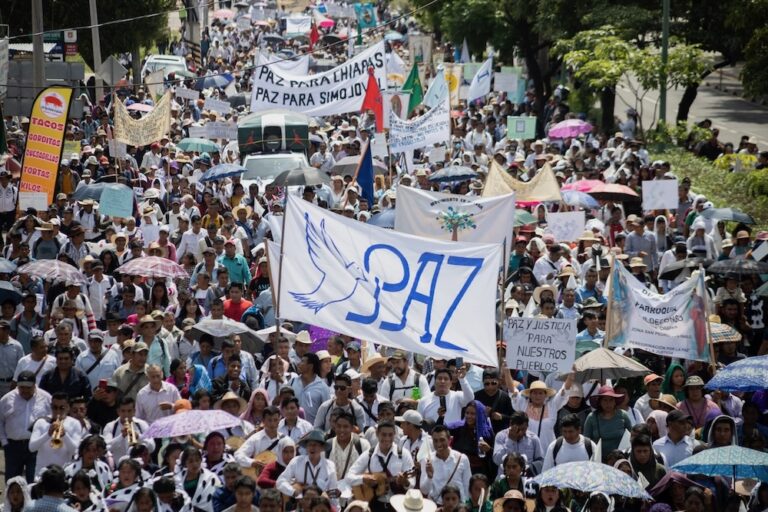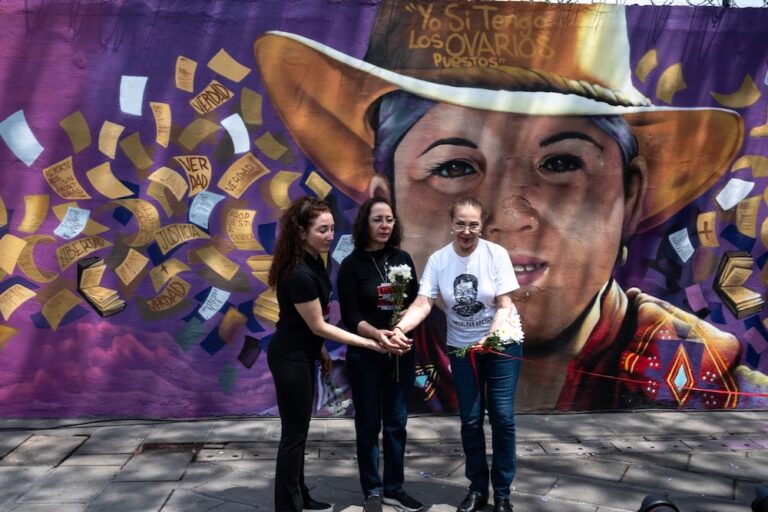(AMARC/IFEX) – The following is an AMARC-Mexico, Fray Francisco de Vitoria Human Rights Centre (Centro de Derechos Humanos Fray Francisco de Vitoria) and Mexican Commission for the Defence and Promotion of Human Rights (Comisión Mexicana de Defensa y Promoción de los Derechos Humanos, CMDPDH) joint statement: AMARC and human rights organisations concerned over loss of […]
(AMARC/IFEX) – The following is an AMARC-Mexico, Fray Francisco de Vitoria Human Rights Centre (Centro de Derechos Humanos Fray Francisco de Vitoria) and Mexican Commission for the Defence and Promotion of Human Rights (Comisión Mexicana de Defensa y Promoción de los Derechos Humanos, CMDPDH) joint statement:
AMARC and human rights organisations concerned over loss of ground in negotiations
On 7 May 2004, during a meeting of the Radio and Television Industry Union (Sindicato de la Industria de la Radio y la Televisión) in Culiacán, Sinaloa, President Vicente Fox Quesada announced that he had instructed the Interior Ministry (Secretaría de Gobernación) and the Communications and Transport Secretariat (Secretaría de Comunicaciones y Transportes, SCT) to close radio stations that he described as “clandestine”, starting in May in Michoacán state. The president said there are 100 such stations in total.
For some time, certain sectors have had a strong interest in confusing the public by failing to differentiate between community-based radio stations and so-called “clandestine” media outlets in order to justify repressive policies against those who demand that they be allowed to exercise their right to freedom of expression via community based radio broadcasts.
We hope the president understands the difference between the so-called “clandestine” media outlets and community radio stations that have shown their willingness to conform to the law and are involved in negotiations with the authorities. Of particular concern is the fact that the SCT has closed a number of community radio stations after having labelled them “clandestine”.
Community radio stations perform an important public service, as was confirmed by the Interior Ministry during visits to several stations in November 2003. The role these stations play was recently recognised through the awarding of a National Journalism Award to Radio Teocelo, based in Veracruz, the only community-based radio station that has been granted an operating licence. Community radio stations are currently involved in a process with the Interior Ministry to review the stations on a case by case basis and advise the SCT with respect to the granting of licences.
A massive closure of these radio stations would violate commitments the government has made to the Inter-American Commission on Human Rights (IACHR) and would go against recommendations made by the United Nations High Commissioner for Human Rights, the IACHR and individuals such as writer Carlos Fuentes and painter Francisco Toledo, who have asked for legal recognition of community stations in Mexico. Such closures would also contradict the government’s own initiatives, given that the Interior Ministry recently formed a working group, under the human rights intersecretarial commission, in order to legalise community radio stations in Mexico.
In addition, on 3 March, at the IACHR’s headquarters in Washington, the Mexican government made a commitment to continue negotiations to resolve the situation of community radio stations in the country. Despite the fact that during the meeting with the IACHR, documentation demonstrating that the community radio stations have applied for licences was produced, the SCT has ignored the requests of citizens’ groups that operate the stations, continuing to grant licences at its discretion.
We, the representatives of citizens’ organisations, will be vigilant in order to ensure that the government respects citizens’ rights to operate radio stations under fair conditions that respect their right to freedom of expression. This right has been systematically violated by the SCT, which has failed to respond to demands to establish transparent criteria for the licencing of community radio stations.
Signed by:
World Association of Community Radio Broadcasters (AMARC)
Fray Francisco de Vitoria Human Rights Centre (Centro de Derechos Humanos Fray Francisco de Vitoria)
Mexican Commission for the Defence and Promotion of Human Rights (Comisión Mexicana de Defensa y Promoción de los Derechos Humanos, CMDPDH)


